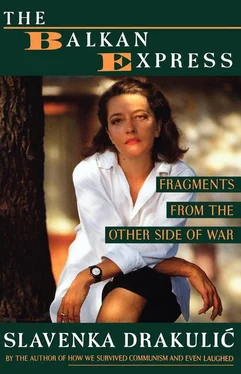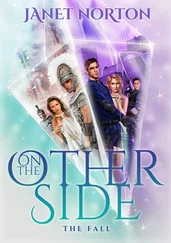Slavenka Drakulić - The Balkan Express - Fragments from the Other Side of War
Здесь есть возможность читать онлайн «Slavenka Drakulić - The Balkan Express - Fragments from the Other Side of War» весь текст электронной книги совершенно бесплатно (целиком полную версию без сокращений). В некоторых случаях можно слушать аудио, скачать через торрент в формате fb2 и присутствует краткое содержание. Город: New York, Год выпуска: 1993, ISBN: 1993, Издательство: W. W. Norton & Company, Жанр: Биографии и Мемуары, Публицистика, на английском языке. Описание произведения, (предисловие) а так же отзывы посетителей доступны на портале библиотеки ЛибКат.
- Название:The Balkan Express: Fragments from the Other Side of War
- Автор:
- Издательство:W. W. Norton & Company
- Жанр:
- Год:1993
- Город:New York
- ISBN:0-393-03496-8
- Рейтинг книги:4 / 5. Голосов: 1
-
Избранное:Добавить в избранное
- Отзывы:
-
Ваша оценка:
- 80
- 1
- 2
- 3
- 4
- 5
The Balkan Express: Fragments from the Other Side of War: краткое содержание, описание и аннотация
Предлагаем к чтению аннотацию, описание, краткое содержание или предисловие (зависит от того, что написал сам автор книги «The Balkan Express: Fragments from the Other Side of War»). Если вы не нашли необходимую информацию о книге — напишите в комментариях, мы постараемся отыскать её.
The Balkan Express: Fragments from the Other Side of War — читать онлайн бесплатно полную книгу (весь текст) целиком
Ниже представлен текст книги, разбитый по страницам. Система сохранения места последней прочитанной страницы, позволяет с удобством читать онлайн бесплатно книгу «The Balkan Express: Fragments from the Other Side of War», без необходимости каждый раз заново искать на чём Вы остановились. Поставьте закладку, и сможете в любой момент перейти на страницу, на которой закончили чтение.
Интервал:
Закладка:
When I discussed the matter with a friend familiar with the case she said to me: ‘Are you sure that Ana was wrong in doing this? When Marta’s father was given the apartment it had most probably been taken from a rich Jew, a bourgeois or enemy of the people during the previous regime.’ This is very likely the truth, but on the other hand Marta’s mother’s family house as well as several apartments were also confiscated and no doubt given to someone else in turn – namely, to someone who ‘deserved’ it because of their achievements during the War. If you want to correct historical mistakes and restore justice – which is not the task of the individual anyway, but of the law – the question is how far back do you go and what is the point in doing it if you allow the very same pattern to be repeated?
However, even the ‘revolutionary law’ of Tito’s partisans was different from breaking the law, which is what Ana did. But if one asked Ana, I am afraid she would see no harm in the ‘new bolshevism’ or her own act. In my view she merely behaved as the dutiful, diligent child of communism. By her act she merely showed she had graduated in the revanchism of the proletariat against its class enemy: this time the communist or ‘red bourgeoisie’ itself. Just as she’d been taught in their school.
ZAGREB APRIL 199217
A LETTER TO MY DAUGHTER
Zagreb, 7 April 1992
My dear R,
This morning I went to your empty room. Its tidiness was so strange: your usually unmade bed now covered with a blue quilt, a clean desk (with a sticker: A clean desk is a sign of a sick mind!), a chair without your T-shirts hanging from it, a carpet without at least three pairs of shoes scattered around and your two dogs Kiki and Charlie playing with a yellow rubber ball. I miss you, I miss your voice, your messages written with a lipstick on a bathroom mirror, your little notes that you leave on the table when you come in late at night and which I read with my first morning coffee.
Just today it is nine months since you left the country. Nine months is such a long time, I thought as I sat there for a moment, time for a baby to be born. What a strange thought. Or perhaps not so strange after all because you are now a grown woman and could decide to have a baby yourself. And because what was born in the past nine months was not a baby but a war – a crippled, disheartening child indeed, but we’ve learned to live with it by now. I knew that you would go anyway, you’d leave me, this house, your room where all of your children’s toys and books remain side by side with your evening dresses and make-up. That thought comforts me. Besides, it’s good for you to go away to live on your own and to escape my overmothering you, the typical fault of a single parent. Living on her own will make her stronger, she will see the world, it is good for a young person to live abroad and Vienna is only six hours away : I keep repeating this to myself like some kind of prayer. Except that I know that you didn’t intend to leave so soon and so abruptly, not only me and your room, but your university and, more important, your friends here. You left behind so many things unfinished. You left because of the war.
It happened right after the ‘Slovenian war’ or the attack of what was called the Yugoslav Federal Army on Slovenia on the night of 26 June 1991. It turned out to be only a prelude to the nightmare of Serbian aggression against Croatia and it seems certain that Bosnia will be next. As you know I was in London at that time, glued to a TV screen and a telephone. We both cried. ‘What do I do, mama?’ you said on that first day of the war but I didn’t know what to advise you. What does one say to one’s child when the war begins? I didn’t want you to panic after the army’s attack on Slovenia, even if it is only a hundred miles from Zagreb. One part of me wanted to believe that it was not a real war (whatever that means) because a real war could not happen, it is too stupid, too absurd – an army attacking its own people, it might happen in some South American dictatorship, not in Europe. But there was another part of me that knew this is it and there was no way back. The signs were clear – people already killed in Plitvice and Borovo selo, and the smell of blood that evaporated from the newspaper pages filling the summer air with heaviness, with premonition.
One afternoon, Tuesday 2 July -I remember with the clarity our memory reserves only for traumatic events – we were talking on the telephone and in the middle of our conversation you started screaming, ‘Mama, they are shooting next door!’ I could hear the shots in a garden next to ours; I could visualize the garden and its high wall covered with roses and bunches of grapes hanging on the vine, the way the sun shone through its leaves at that particular moment of the late afternoon. And I could see you standing there, by the window overlooking it, lost and pale, trembling. You dropped the receiver and then I heard your voice, half cry and half whimper, as if you were no longer a human being but a wounded dog. I can hear it now, every sound that entered the receiver on that day, the distant sound of radio news in the background, the tram that passed by the house and the silence, that sudden silence that followed it. Then your boyfriend Andrej’s frightened yet soft voice trying to calm you down. Hush, it’s nothing, it’s nothing he said, but it was too late because that was the moment when the war began for both of us, and we realized it.
I still think about the sound that you uttered that afternoon. I couldn’t recognize it as my child’s voice. Because it wasn’t a voice, not even a scream of utter fear. It was the sound of someone falling apart, of disintegration. I didn’t recognize you because I was losing you. I sat at the end of a telephone line, my whole body weak, lifeless, collapsed. I don’t think I’ve ever experienced such helplessness. Suddenly, an old image came back to me – of the two of us travelling on a train. You were two years old and had fallen asleep in my arms. I looked at your face, your eyelids almost transparent, half-open mouth and forehead with tiny little drops of sweat. You looked so small and vulnerable as if anything in this world could hurt you. I felt such an urge to protect you, like a sharp pain deep in the chest. The very same pain I felt sitting there and waiting to hear your voice again – only now I wasn’t there to protect you. If only I was there, I thought, forgetting for a moment that you were grown up, you had to protect yourself and I could only help. When Andrej came to the phone, he said it was probably a drunken soldier, nothing more. I should not worry, he said. But worry was not the right word. I was calm. At that moment I knew that if you didn’t get out of there I’d lose you. Not from a bullet or shelling, but your mind would crack and you would enter a void where no one could reach you any longer. I know you well, I know how much you can take and I can recognize the signs when you reach the edge. The day after, your voice still broken, different, you told me that almost all of your hair had turned grey. Ever since that day, I thank God that you are not a man, that I am the mother of a woman. To have a son in wartime is the worst curse that can befall a mother, no matter what anyone says.
You could not imagine how lonely I get sitting in your room, a kind of clutching feeling in my breast, a choking knot in my throat. Don’t worry, I don’t cry, I know you wouldn’t like it. I just think of what this war is doing to us, breaking our lives in two, into before and after . I know that you are all right, as much as you could be living in a foreign country. The most important thing is that you are safe, that you are holding up. Living in a country at war, I try to convince myself that what happened to the two of us is nothing, we are just separated, that’s all, we’d have had to face that anyway. It couldn’t be compared to what other people have had to go through, loss of lives, of homes, of everything. But in suffering there are no comparisons, I cannot suffer less because someone else is suffering more, any more than I can take someone else’s burden of pain. I have my own, as little as it may seem from outside. Our emotions are not based on the objective truth anyway so why should I bother with justifying my feelings? Nonetheless, I do feel guilty in another way.
Читать дальшеИнтервал:
Закладка:
Похожие книги на «The Balkan Express: Fragments from the Other Side of War»
Представляем Вашему вниманию похожие книги на «The Balkan Express: Fragments from the Other Side of War» списком для выбора. Мы отобрали схожую по названию и смыслу литературу в надежде предоставить читателям больше вариантов отыскать новые, интересные, ещё непрочитанные произведения.
Обсуждение, отзывы о книге «The Balkan Express: Fragments from the Other Side of War» и просто собственные мнения читателей. Оставьте ваши комментарии, напишите, что Вы думаете о произведении, его смысле или главных героях. Укажите что конкретно понравилось, а что нет, и почему Вы так считаете.












